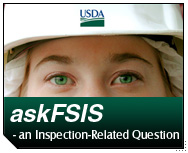 |
|
|
|
|
|
|
 |
|
In order to protect the food supply, FSIS must be aware of information pertaining to threats to the food
supply and have the capability to monitor and detect acts of intentional contamination. FSIS continues to
enhance its laboratory and other surveillance capabilities to detect intentional contamination of meat, poultry
and egg products, including strengthening its relationships with the intelligence and law
enforcement communities. |
Surveillance Capabilities
In order to help prevent an attack or to detect an attack if it were to occur, it is important that FSIS
conduct surveillance activities.
- FSIS has a representative assigned to Custom and Border Protection's Import Safety Commercial
Targeting Analysis Center (CTAC), which is devoted to supporting the development of strategic
and operational plans to address health and safety risks. Other government agencies
represented at the CTAC include the Consumer Product Safety Commission, the Food
and Drug Administration, and the Environmental Protection Agency. The CTAC will
develop special operations and national interventions in response to alleged or apparent import safety violations will be conducted by the CTAC.
- FSIS has hired 22 Import Surveillance Liaison Officers who are responsible for the agency's
oversight of food defense issues relating to imported food products at ports-of-entry, border
entries, and in-commerce around the nation. In particular, they have expanded their liaison
activities with DHS' Customs and Border Protection.
- In order to better detect and respond to the intentional contamination, FSIS is developing a
system using predictive models to assess its public health and inspection data.
- FSIS randomly tests processed products for threat agents that have been identified as concern.
- FSIS has also developed a system to rapidly identify, respond to and track significant incidents,
such as intentional food contamination and other large scale food emergencies spanning multiple
jurisdictions.
- FSIS utilizes the following surveillance systems currently in place:
- Consumer Complaint Monitoring System (CCMS): This system records, sorts,
analyzes, and tracks consumer complaints received by the agency about FSIS-regulated products.
- FSIS' Incident Management System (FIMS): A web-based common operating
platform that allows program managers and users to rapidly identify, respond to and track the Agency's
response to significant incidents such as suspected tampering of products, threats to
facilities, natural disasters, and Class I recalls with illness.
- Import Alerts Tracking System (IATS): Tracks illegal and ineligible shipments
that may have entered the U.S. This automated data system operates under the FIMS platform and
also tracks potential incidents of concern involving meat, poultry, and egg products.
- Agency field personnel conduct food defense verification tasks to ensure that potential vulnerabilities
in establishments that could lead to or allow deliberate contamination are identified. This information
is also analyzed to identify trends. Suggestions are made to facility management as to how they can be
mitigated to the maximum extent possible.
FSIS Laboratories
Links:
FSIS expanded its laboratories' capability and capacity to test for non-traditional microbial, chemical, and
radiological threat agents that could be used to contaminate food. Since 2003, over 500,000 random samples
have been analyzed.
The agency also constructed a 2,000 square foot Biosafety Level-3 laboratory to analyze samples for threat
agents and provide support in the event of an incident.
Food Emergency Response Network (FERN) and the Electronic
Laboratory Exchange Network (eLEXNET)
The agency's surveillance capacity is also enhanced through the Food Emergency Response Network (FERN),
co-chaired by FSIS and FDA. FERN is a nationwide laboratory network that integrates existing Federal and
State food-testing lab resources by using standardized diagnostic protocols and procedures.
eLEXNET is the electronic database system that was developed in conjunction with FERN to facilitate the
rapid sharing of test results and other information among all FERN members.
Building Relationships with the Intelligence and Law Enforcement Communities
Links:
FSIS continues to strengthen coordination and communication on food defense activities with law enforcement
and intelligence agencies at the national and local level. At the local level FSIS educates and interacts
with Federal and State law enforcement and intelligence personnel on possible threats to the safety of the
food supply through participation in information-sharing forums such as Area Maritime Security Committees
at ports of entry, Joint Terrorism Task Forces (JTTF), and the Federal
Bureau of Investigation (FBI)-sponsored Infragard/AgGard
organization and Agriculture Security Working Groups.
To ensure that the collection and analysis of intelligence information considers food defense concerns, FSIS
provides these communities with key information on vulnerabilities of the food supply and information needs.
|
Last Modified: August 21, 2012 |
|
|
|
 |
 |

|

|
|

|

|
 |
FSIS Advertisement Rotator

|
|
|
|
 |
